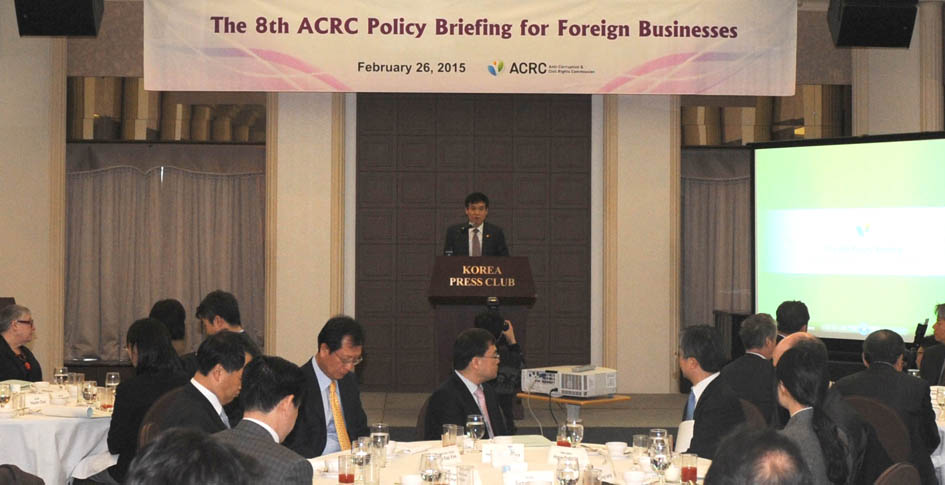News & Publications
Press Release
ACRC holds the Policy Briefing for Foreign Businesses
- Date2015-02-26
- Hit2,498
| On February 26, the ACRC held the "ACRC Policy Briefing for Foreign Businesses" to introduce Korea’s major anti-corruption policies to foreign businesses in Korea and to listen to their difficulties and grievances. The policy briefing was attended by about 80 representatives from global corporations and members of foreign chambers of commerce in Korea, including AMCHAM Korea Chairman James Kim (CEO of Microsoft Korea) and Seoul Japan Club Vice Chairman Hiroe Tadashi (CEO of Marubeni Korea). |  |
| At this policy briefing, ACRC Chairman Lee Sungbo confirmed the strong determination of the Korean government to fight against corruption and introduced major anti-corruption policies and plans for this year. In particular, the Chairman stressed that the Improper Solicitation and Graft Act is aimed at ensuring stricter disciplines of public officials and protecting public officials who have maintained a high level of integrity by strengthening the behavioral standards of public officials in the existing "Code of Conduct for Public Officials" and introducing effective sanctions including criminal punishments and fines for negligence. The foreign businessmen who attended the meeting showed a lot of interest in the main contents of the Improper Solicitation and Graft Act and the follow-up measures to be taken. Furthermore, they pointed out the needs to address some discriminatory practices against foreign workers, inconveniences in using Korean websites by foreigners, and problems related to the recovery of corruption proceeds under current legal frameworks. Since its launch in 2008, the annual policy briefing has contributed to raising the awareness and enhancing the understanding of foreign businessmen on Korea's anti-corruption policies. Moreover, the meeting has served as a channel to reflect the suggestions of foreign enterprises in policies and listen to the difficulties faced by foreign businessmen in doing business and living in Korea. For example, as a follow-up to a suggestion made at the previous session, new provisions on outside lectures by national/public health care professionals have been added to the code of conduct for public health and medical service. The ACRC is planning to follow up the proposals and difficulties raised at this meeting and to notify the participants of the measures taken. The Commission will continue to promote Korea's anti-corruption efforts and support management and investment activities of foreign businesses through continuous communication with the foreign business community in Korea. | |









